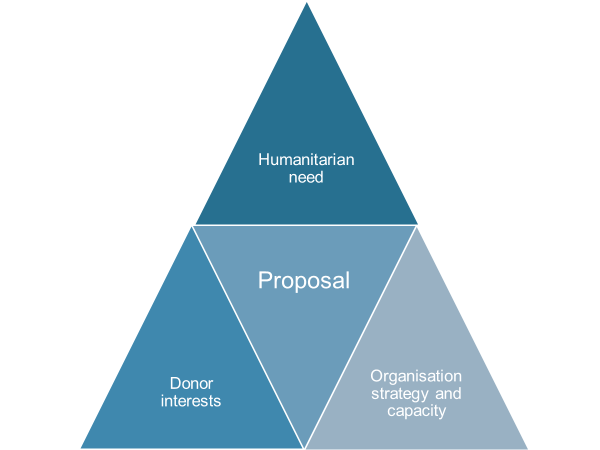Table of Contents
What is proposal?
The primary purpose of a proposal is to convince a donor agency to fund your project. Effective proposals are important for any organisation and is one of the most crucial aspects of any NGO. It doesn’t matter how big or small your organisation is, you cannot get away from writing a project proposal, with the aim to secure funds. But what makes a good proposal? Generally, most proposals usually include the following elements:
- Executive Summary: States the rationale for putting the proposal into effect, and summarises the proposal.
- Statement of Need: Details about why the project the proposal recommends is necessary.
- Organisation Details: Provides information about the organisation submitting the proposal, including its mission, and the scope of its programs and services.
- Project Description: Explains specifics of the project, and how it will be implemented and how it will be evaluated.
- Budget Analysis: Provides and explains how the project will be financed.
- Conclusion: Summarises the proposal’s main points.
The ingredients for a winning proposal
A proposal has a lot of different purposes, but there’s only one good way to write one: the way that pulls together all of the information in a concise and persuasive way and helps you get what you want. When you start writing a proposal, you need to remember the basic principle of a robust proposal. Here are my 7 top tips:
Follow the guidelines:
In most cases, donors provide specific instructions about what they expect. It’s important to follow these guidelines and/or instructions in addition to understanding all of the requirements included in the application. When reading through the instructions, its good practice to go through them over again while making note of key information to help you remember the important stuff that will be required for writing your proposal.
Start early:
Never delay writing your proposal, or even worse, leaving it until near the deadline date for submission. It’s vital to begin writing your proposal early. In my experience of writing proposals, I’ve made it a habit to prepare myself a simple work plan of action, with deadlines, for preparing each section of the proposal. This way, you’re ahead of schedule and you’ve given yourself time to complete the proposal accordingly.
Write clearly and make it convincing:
Reviewers have to go through several proposals, so make it an objective to make your case clear and avoid writing unnecessary details. Put yourself in the position of a reviewer. Avoid writing irrelevant things.
Engage your team:
It’s very important to engage your team or, as I like to call them, “key players” when preparing your proposal. For example, a project manager is more experienced for writing about how your project or idea is going to be implemented. Therefore, it’s important to engage him/her into the process. Additionally, a financial manager’s expertise is most definitely required for ensuring your proposal meets the budget requirements of the donor. So it’s important to keep your key players engaged during the proposal writing process.
Use data and facts to support your proposal:
Only write what’s important and mention the facts that strengthen your case. Most importantly, make sure your facts are up-to-date, particularly when using facts such as government reports, research articles, news articles, etc.
Avoid too much technical language:
Always keep in mind that the reviewer reviewing your proposal may not be an expert in a particular field. Therefore it’s important to use easy to understand language throughout the proposal.

Review, review and revise:
I strongly recommend and advise that final proposals be reviewed by colleagues before submitting them. Ask them to provide their feedback, criticisms, ideas and comments. Reviewing it over and over helps in improving the quality of the proposal. Then lastly, do a final revision check to make sure you’ve followed the instructions of the donor agency and that you’ve met the requirements.
Capacity building in proposal writing

The Humanitarian Academy for Development offers a 3 day course in Proposal Writing and covers topics such as understanding the donor’s requirements, proposal writing process and roles, assessment and analysis, project design, budgets and other key areas which helps participants write, not just good proposals, but winning proposals too. To better understand the course objectives, HAD has developed a proposal triangle which describes the areas that piece together a good proposal. The course is specifically aimed at Project managers, Coordinators and Officers in addition to Grant Managers, Coordinators and Officers. By the end of the course, participants will:
- List the contents of proposals and concept notes, and outline key differences between the two documents.
- Recall the need to consider organisational strategy, donor interests and humanitarian or development need before developing a proposal.
- Develop a plan for the proposal writing process and engage key stakeholders in the process.
- Outline the use of a Theory of change to demonstrate how change will happen.
- Outline the use of a logical framework and recognise the difference between activities and results at different levels.
- Compare requirements of and templates used by different donors.
- Write proposals in a style which is concise, accurate and engaging.
- Write narrative to accompany an activity-based budget.
- Integrate international standards and cross cutting themes throughout a proposal.
- Review proposals and make suggestions for improvements.
Written by Yasser Yehiah
Partnerships and Programme Manager






